Metropolitan New York Synod

The Metropolitan New York Synod (MNYS) is the regional expression of the Evangelical Lutheran Church in America (ELCA). The ELCA is one of the largest Christian denominations in the United States, with about 3,5 million members. The ELCA has three expressions: over 9,000 congregations, 65 regional synods, and the churchwide organization. The Metropolitan New York Synod is the regional expression of the Evangelical Lutheran Church in America.[1]
Territory
The Metropolitan New York Synod covers all five boroughs of New York City, all of Long Island, and seven upstate counties (Dutchess, Orange, Putnam, Rockland, Sullivan, Ulster, and Westchester counties). It is divided geographically into 18 conferences and home to 190 parishes, from rural outposts to inner-city churches, and suburban congregations. Members worship in over a dozen languages, including Spanish, Arabic, Cantonese, Mandarin, Norwegian, German, and American Sign Language.[2]
Membership
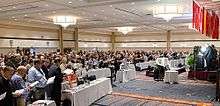
The Metropolitan New York Synod has:
- 63,959 baptized members living among 13.5 million people living within the synod territory;
- 16,009 in weekly worship;
- 190 congregations; around 300 pastors; and
- over 100 rostered lay leaders, including associates in ministry, diaconal ministers, deaconess, and synodical deacons.[3]
Beliefs
See the Evangelical Lutheran Church in America.
Bishop
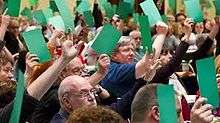
Bishop is elected to serve a six-year term by the Metropolitan New York Synod Assembly. The Rev. Dr. Robert Alan Rimbo was first elected in the spring of 2008 and re-elected May 31, 2014 to serve a second six-year term as Bishop of the Metropolitan New York Synod of the Evangelical Lutheran Church in America (ELCA).[4]
In the Evangelical Lutheran Church in America each synod elects a bishop to oversee the administration of the synod and its staff. Additional duties, as prescribed by the Evangelical Lutheran Church in America for Synod Bishops are that of synod spiritual guide, a member of ELCA Conference of Bishops, an ecumenical liaison, and speaker and published author.[5]
Rimbo was re-elected on a platform that also adopted the Synod's first 10-year strategic plan; a plan that "reinvests in its communities by seeking creative solutions for recommitting to ministry in places where its traditional presence may be enhanced to more fully serve the community."[6]
Biography
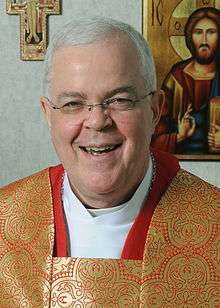
The Metropolitan New York Synod Robert Alan Rimbo is bishop of the Metropolitan New York Synod of the Evangelical Lutheran Church in America (ELCA). He was formerly the pastor of Holy Trinity Lutheran Church in New York City, and immediately prior to that, bishop of the Southeast Michigan Synod, ELCA.
A graduate of Concordia Senior College, Fort Wayne, Indiana (1972), and Christ Seminary - Seminex, St. Louis, Missouri (1976), Bishop Rimbo holds an honorary Doctor of Divinity from The General Theological Seminary of the Episcopal Church (2010).
Bishop Rimbo has served the church in a variety of ways: pastorates in Michigan, New York and New Jersey; assistant to the bishop in the Southeast Michigan Synod; director of music in several parishes; and executive assistant to the project director for the Lutheran Book of Worship (1978). He has worked as chaplain, editor, advisor, and coordinator for many boards and projects relating to worship and parish ministry. He has influenced and guided social services, health, and music through board memberships with Lutheran Services New York Alliance, Lutheran Health Care (Brooklyn) and the national Lutheran Music Program. He is also a member of the Association of Lutheran Church Musicians[7] and of the North American Academy of Liturgy.[8][9]
Bishop Rimbo has given major addresses at the Institute of Liturgical Studies at Valparaiso University, the Pastoral Liturgy Institute of Notre Dame University, the Leadership Conference of Lutheran School of Theology at Chicago, and at various meetings of the Association of Lutheran Church Musicians. He has published essays, sermons, and numerous articles about worship and is the author of Why Worship Matters (Augsburg Fortress Publishers, 2004). He was an editorial team member for the Renewing Worship project of the ELCA, which published Evangelical Lutheran Worship (2006). He represents the ELCA on the ecumenical Consultation on Common Texts.
Bishop Rimbo is married to Lois, a retired elementary school reading and language arts specialist. They are the parents of two adult children, Deborah and Justin (married to Angela), and the grandparents of Owen Robert and Zoe Elizabeth.[6]
Synodical Bishop
The episcopate is the status or term in office of an individual bishop.
Strategic plan

Formally known as the "Claimed Gathered Sent" initiative, the Synod 2013-2023 Strategic Plan was adopted by the Synod Assembly in 2012 to be "an ambitious transformative measure that will allow us to proclaim the gospel in new, innovative ways in the ever-changing, fast-paced environment of our world. The ten-year plan is designed to ensure that the Lutheran church remains relevant--not only in the lives of the faithful, but among the communities we seek to serve."[10]
The three committees, entitled Claimed, Gathered, and Sent, each have a specific role in implementing the Strategic plan. The Claimed Committee mission is "To help people grow in their faith through interaction and engagement with the Lutheran Tradition," the Gathered Committee mission is "To ensure that Word and Sacrament ministry is provided in the metropolitan New York area," and the Sent Committee mission is "To network congregations, ministries, and leaders to proclaim the Gospel while responding to specific societal needs and issues."[11]
Since adoption its implementation has included an number of measures to assist congregations, fund leadership development programs, and several measures to develop new ministries.[12]
The Wall Street Journal profiled these efforts in 2014, reporting on the Bishop's efforts to "find the places where [the church is] not present and reach out…whether that's on social media or elsewhere." According to the Wall Street Journal, such efforts include "speaking his mind on several hot-button social issues and [working] with area pastors to create alternative church services throughout the New York City area."[4]
Innovative worship

Many of the synod's ministries have received significant media attention for innovations in worship.[4] Such ministries include, St. Lydia's "Dinner Church" in Gowanus, Brooklyn which has been widely credited with popularizing the "Dinner Church"[13] and "Micro-Church"[14] concepts and Lutheran Church and Parables in the Williamsburg section of Brooklyn which was profiled for its "Art Service" where churchgoers use paint and clay to tell personal stories.[4]
Other churches receiving significant media attention are Holy Trinity and St. Peter's Lutheran Churches. In 2008 the well-attended Bach Vespers at Holy Trinity Lutheran Church was the subject of a New York Times profile describing it as "New York's Temple to Bach."[15][16] St. Peter's, likewise, was the subject of a New York Times profile for its extraordinary Jazz Vespers service, and was chronicled, in particular, for its famed "All Night Soul" worship service. According to the Times, it "attracted more and more musicians as parishioners, congregants and performers - so many that the annual All Night Soul concert has become one of New York's most impressive gatherings of jazz talent."[17] Though the "All Night Soul" service was most popular in the early to mid-1980's, St. Peter's continues to offer some of the city's best Jazz as a member of the Grand Central Station Partnership summer concert series, "Jazz on the Plaza."[18]
Congregation mergers
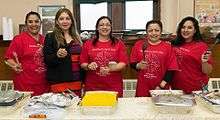
As part of the strategic plan, the synod has created an innovative pilot project to assist individual congregations interested in merging with each other to form new "regional-churches"[19] equipped with the resources to minister to surrounding and neighboring communities. Congregations participating in the pilot-project did so through votes to merge and participated in "round robin" worship service prior to the merger vote; thereby becoming acquainted with each other in advance.[20]
Among the most successful pilot projects are the merging of four individual congregations into a unified, "regional-church," All Saints / Todos Los Santos, capable of administering ministry to its Queens and Brooklyn neighborhoods, and Augustana Lutheran Church in East Elmhurst with Grace Lutheran Church in Astoria, home to the #4 rated pre-school in New York City (Astoria Lutheran School).[21]
Latino ministry
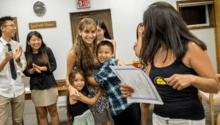
The Latino community is: the fastest growing ethnic community in the ELCA; the largest growing ethnic group in the United States; and the largest minority community in the metropolitan New York area.[22]
In the Metropolitan New York Synod 14 Latino congregations are led by five full-time and nine part-time pastors, some of whom serve in a bi-lingual or tri-lingual context. These pastors come from eight different countries, and are assisted by 10 congregational or synodically-rostered deacons.[22]
Initiatives to support the development of this ministry include an English Language school run out of a Lutheran Congregation in Deer Park, Long Island where, with a sister group in Brentwood, church volunteers work with a partner to hold English as a Second Language classes on site.
For 10 weeks each summer, senior high school students teach free classes twice a week.The program has become an internship that has helped many get into Ivy League schools. The program also offers GED, computer and citizenship classes and, with its sister organization, serves about 80 students a year.[23]
Same-sex marriage
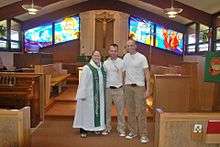
The national Lutheran church organization (ELCA) amended its marriage stance in 2009, voting to allow individual congregations to bless same-sex unions. Bishop Rimbo said, he himself went through a "complete reversal" on same-sex marriage in the late 1980s after working with a fellow church official who is lesbian, "It took lots of soul searching and conversion but I got there." He officiated his first same-sex wedding in June 2014.[4]
Racial justice
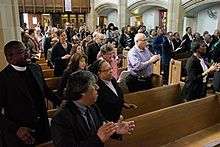
In 2014 following protests in many U.S. cities, after the deaths of Eric Garner in State Island and Michael Brown in Ferguson, Missouri, Rimbo initiated inter-faith discussions on how to end racism in America, entitled "A Service for Justice and Reconciliation.[24] Hundreds attended the inter-faith service where religious leaders offered guidance on racial issues from traditional texts.[24]
The 2015 Metropolitan New York Synod Assembly formally adopted and funded measures to continue "the Synod's commitment to address racism in the church and society" and directing that the Synod design, implement and fund racism training through which participants can "develop a common analysis, an anti-racist identity, and the knowledge that will assist them in addressing, confronting, and working toward the dismantling of racism."[25]
Environmental policy
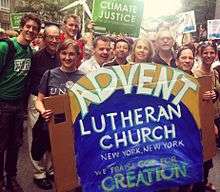
The 2015 Metropolitan New York Synod also adopted a resolution "to divest from fossil fuels within five years."[26] The resolution was the culmination of work begun by the Synod shortly after the People's Climate March, a gathering of 400,000 people in New York City September 2014 of which the Synod was involved in organizing.[27]
Ecumenical and interfaith relations
Bishop Rimbo personally came out for the practice of intercommunion, in which Christians of different denominations can receive Communion at one another's services in 2000.[28]
Churchwide organization
The Evangelical Lutheran Church in America (ELCA) is a mainline Protestant denomination headquartered in Chicago, Illinois. The ELCA officially came into existence on January 1, 1988, by the merging of three churches. As of 2013, it had 3,863,133 baptized members.[29] It is the seventh-largest religious body[30] and the largest Lutheran denomination in the United States.[31] For more information refer to the ELCA.
ELCA
The ELCA is headed by a Presiding Bishop, who is elected by the Churchwide Assembly for a term of six years (it was a four-year term until 1995). To date, four ministers have been elected to the position of Presiding Bishop of the ELCA. Herbert W. Chilstrom served as the first Presiding Bishop from 1987 to 1995. He was followed by H. George Anderson (1995–2001), who had previously been the President of Luther College. The third Presiding Bishop was Mark S. Hanson, who is the past president of the Lutheran World Federation. Hanson began his tenure as Bishop of the Church in 2001 and was re-elected in August 2007 for a second term. Elizabeth Eaton was elected Presiding Bishop in August 2013 and took office on November 1, 2013. The ELCA is divided into 65 synods, one of which is non-geographical (the Slovak Zion Synod) and 64 regional synods in the United States and the Caribbean, each headed by a synodical bishop and council.[32]
Synods
Within the ELCA the term synod refers to the middle judicatory, which is referred to in some other denominations as "presbyteries", "districts", "conferences" or "dioceses" (the most ancient and traditional term). In other Christian churches, the term "synod" is used for a meeting or conference of ministers such as priests or bishops of a diocese, province (region) or nation or in some Protestant churches as the term for their annual governing convention. Some Evangelical Lutheran denominations overseas continue to use the ancient church title of "diocese".
Each synod elects a bishop to oversee the administration of the synod and its staff.[5] In addition to synodical responsibilities, the 65 synod bishops join the elected ELCA Presiding Bishop and Secretary to form the Conference of Bishops. This 67-member group gathers at least twice each year for worship and study, mutual sharing and to conduct business.
While primarily advisory, the role of the Conference of Bishops is significant within the life of this church. The conference elects its own officers, has standing committees and a representative to each ELCA churchwide unit and separately incorporated ministry. The conference has a particular role in matters related to rostered leaders and also reviewing proposals before they are passed along to the ELCA Church Council for adoption.
The conference advises the Presiding Bishop in matters related to churchwide planning and ecumenical relations.[5]
International
Outside of the United States, ELCA also has congregations in the Caribbean region (Bahamas, Bermuda, Puerto Rico and the U.S. Virgin Islands) and one congregation in the border city of Windsor, Ontario, a member of the Slovak Zion Synod. Before 1986, some of the congregations that form the Evangelical Lutheran Church in Canada were part of the ELCA's predecessor churches.
Universities and partners
Within the church structure are divisions addressing many programs and ministries. Among these are support for global mission, outdoor ministries, campus ministries, social ministries, and education. They include the Lutheran Peace Fellowship, Lutheran Women's Caucus, Lutheran Volunteer Corps, and the Lutheran Youth Organization ELCA Youth Gathering (formerly known in predecessor denominations as the Luther League). They cooperate with an ecumenical inter-Lutheran college/university student organization known as the Lutheran Student Movement-USA founded in 1922 and reorganized in 1969. The denominational publishing house is Augsburg Fortress, and the official denominational magazine is The Lutheran. ELCA predecessor bodies established twenty-six colleges and universities now affiliated with the ELCA and a large number of associated theological seminaries, some of which are associated with neighboring universities or theological consortia.
Local organization
Most local congregations are legally independent non-profit corporations within the state where they are located that own their own property. Actual governing practice within the congregation ranges from congregational voters' assemblies or annual and special congregational meetings to elder-and-council-led, to congregations where the senior pastor wields great, if informal, power (more common in larger churches).[33]
References
- ↑ "About". Elca.org. Retrieved 3 August 2017.
- ↑ "What Is a Synod? - What Is a Synod? - MNYS". Mnys.org. Retrieved 3 August 2017.
- ↑ "Who We Are - MNYS". Mnys.org. Retrieved 3 August 2017.
- 1 2 3 4 5 Kravitz, Derek (8 March 2014). "Lutheran Bishop Robert Alan Rimbo Is Reaching Deep". Wsj.com. Retrieved 3 August 2017 – via www.wsj.com.
- 1 2 3 "Conference of Bishops". Elca.org. Retrieved 3 August 2017.
- 1 2 "Metropolitan New York Synod of the Evangelical Lutheran Church in America (ELCA) Reelects Bishop Robert Alan Rimbo". Patch.com. 2 June 2014. Retrieved 3 August 2017.
- ↑ "Association of Lutheran Mission Agencies - Home". Alma-online.org. Retrieved 3 August 2017.
- ↑ "North American Academy of Liturgy (NAAL)". Naal-liturgy.org. Retrieved 3 August 2017.
- ↑ "Bishop Rimbo - Staff Directory - MNYS". Mnys.org. Retrieved 3 August 2017.
- ↑ "Transformative leadership for our strategic plan - MNYS News - News - MNYS". Mnys.org. Retrieved 3 August 2017.
- ↑ "Strategy Committee Information : For Such A Time As This : 2013 - 2023 Strategic Plan" (PDF). Mnys.org. Retrieved 2017-08-03.
- ↑ "We are church together : Section B: Reports from Synod Council, Staff, Committees, and Partner Organizations" (PDF). Mnys.org. Retrieved 2017-08-03.
- ↑ Kaleem, Jaweed (11 May 2015). "The Surprising Sacred Gathering Spaces That Are Moving Into Your Neighborhoods". Huffingtonpost.com. Retrieved 3 August 2017 – via Huff Post.
- ↑ Scott, Rev Emily M. D. (10 June 2014). "We've Seen Megachurch. But How About Micro-Church?". Huffingtonpost.com. Retrieved 3 August 2017.
- ↑ "Bach Vespers - The Evangelical Lutheran Church of the Holy Trinity". Bachvespersnyc.com. Retrieved 3 August 2017.
- ↑ Oestreich, James R. (23 July 2008). "At Holy Trinity Lutheran Church, New York’s Temple to Bach, a High Priest Arrives to Conduct". The New York Times. Retrieved 3 August 2017.
- ↑ Palmer, Robert (9 October 1981). "JAZZ SWINGS THROUGH NIGHT AT ST. PETER'S MARATHON". The New York Times. Retrieved 3 August 2017.
- ↑ "Summer Concerts - Grand Central Partnership". Grandcentralpartnership.nyc. Retrieved 3 August 2017.
- ↑ "Metropolitan New York Synod". Facebook.com. Retrieved 3 August 2017.
- ↑ "Queens places of worship to close". Qchron.com. Retrieved 3 August 2017.
- ↑ "Merger yields a sense of possibility - MNYS News - News - MNYS". Mnys.org. Retrieved 3 August 2017.
- 1 2 "Latino Ministries - Latino Ministries - MNYS". Mnys.org. Retrieved 3 August 2017.
- ↑ "English school looks to expand on LI". Newsday.com. Retrieved 3 August 2017.
- 1 2 "Interfaith gathering takes steps to stop racism". Newsday.com. Retrieved 3 August 2017.
- ↑ "SUMMARY OF THE ACTIONS OF THE 2015 METROPOLITAN NEW YORK SYNOD ASSEMBLY" (PDF). Mnys.org. Retrieved 2017-08-03.
- ↑ "We are church together : Section A: Welcome, Agenda, and Voting Materials" (PDF). Mnys.org. Retrieved 2017-08-03.
- ↑ "Strong Lutheran presence at the People’s Climate March - MNYS News - News - MNYS". Mnys.org. Retrieved 3 August 2017.
- ↑ "Lutheran bishop endorses intercommunion". natcath.org. Retrieved 3 August 2017.
- ↑ "ELCA Facts". ELCA.org.
- ↑ "NCC's 2010 Yearbook chronicles church trends". WFN. February 12, 2010.
- ↑ "Quick Facts". ELCA. Archived from the original on October 26, 2007. Retrieved December 13, 2007.
- ↑ For further information about the ELCA's structure and organization, see 2005 ELCA Constitution Archived 2007-03-17 at the Wayback Machine. (pdf document, retrieved March 27, 2007)
- ↑ See the Model Constitution for Congregations Archived 2007-03-17 at the Wayback Machine. (retrieved March 27, 2007) - especially Chapter 5 "Powers of the Congregation" and Chapter 7 "Property Ownership".